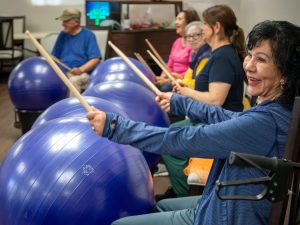The Salvation Army is launching initiatives from culinary to construction
Hope Harbor Culinary Arts
Lodi, Calif.
At age 6, Barry Crall was in the kitchen making pancakes.
“They say you’re born to be a chef, and I guess I was,” he said. Crall trained under three chefs before becoming one in 1985 and has worked in the restaurant business ever since. He cooked at family-owned restaurants and published recipes in Northern California Fine Dining, and now is the chef instructor at The Salvation Army Lodi Hope Harbor Culinary Arts Program.
Since the program’s first session in January 2008, 106 students have graduated, 90 percent of whom are currently working—74 percent are working in the restaurant industry.
The 86-bed Hope Harbor Family Service Center opened in 2005. Crall—a graduate of the Stockton Adult Rehabilitation Center (ARC)—took the lead of the job skills training program after an advisory board member recognized the kitchen’s potential.
The Army contracted with a local college chef instructor, who mentored Crall for the first year, and helped to adapt a four-year curriculum into a 16-week course. A residential program, the culinary arts program accepts 10 students per session from area ARCs and other sobriety programs. The $5,000 per student cost is generated by grants, foundations and private funding.
The course includes academics, hands-on training, visits to food service operations and one-on-one mentoring by industry professionals to prepare students to be a prep or line cook. Each student finishes the class with a ServSafe certificate and a portfolio that details the course and includes pictures of his or her work.
“We joke that we want these students to pay taxes, because we want them to be productive members of society,” Crall said. “They come out trained as entry-level prep cooks, who could cook a breakfast line with ease.”
One graduate—despite a history dotted with prison, narcotics and violence—landed a full-time job as a chef at a local senior citizens social club. He cooks a hot lunch there every day.
Lodi’s Wine and Roses has hired nine of Crall’s students, and others work at local golf and country clubs. Crall said employers are now approaching him looking for chefs.
“With a new job skill, they don’t need to turn back to what they’ve known before,” Crall said. “That’s my ministry.”
Anne’s House Soaps
Chicago, Ill.
Any skill can be put to work for good, and that includes soap making.
That’s what one volunteer found out through The Salvation Army PROMISE (Partnership to Rescue Our Minors from Sexual Exploitation) Program to combat sex trafficking of children through awareness, prevention, intervention and service delivery.
The unique model began in Chicago in 2005 and has since trained over 20,000 first responders in five major cities in the use of a commercial sexual exploitation of children curriculum developed through a $1 million Department of Justice grant; launched an anti-trafficking prevention education curriculum, TraffickED, in Chicago high schools and middle schools; launched hotel and law enforcement training sessions, HALT, with various convention bureaus throughout Illinois; and operated Anne’s House, a long-term trauma-based residential home for young women recovering from sex trafficking.
“The volunteer happens to be a soap maker, and we asked her what specifically she would want to do to help our efforts,”said Frank Massolini, PROMISE program director and founder of Anne’s House. “As a result, she started with training the young ladies in making hand soap.”
That was in 2013, and Anne’s House Soap has to date sold approximately $17,000 worth of product.
Volunteers from a local church banded together to host the monthly soap making activities, creating fragrances and settling molds together with the Anne’s House young women. The more than 3,000 bars of soap they create annually are packaged and sold at boutiques, fair trade shows and online.
“It is a form of therapy as the young women are in a beautiful environment in a church cafeteria with the spiritual involvement of mentors; it’s transformative in making something,”Massolini said. “Maybe for the first time in their lives, they are learning how to produce a product and becoming part of the legitimate economic system not apart from it. For anybody who wants to learn and participate in this country’s wonderful free enterprise system, if you think of a product, and produce it and market it, you can create something and run a business. That’s a whole awakening to them.”
In addition to the mixing and molding, Massolini said the young women are involved in the business side, helping to make decisions on buying, pricing, tax ramifications and marketing. They also determine how to spend the profits, to date having purchased backpacks and school supplies, an overnight trip to Six Flags Great America and a Wii video game console for the house.
“If you know how to run a soap business, someday you can run IBM,”Massolini said. “Plus they like when the revenue comes in.”
GreenWorks Landscape Management
Dallas, Texas
The Salvation Army Dallas-Fort Worth Metroplex Command discovered in 2010 it was spending a substantial amount of money on paying an outside contractor to maintain its own properties. Donnie Freeman, social enterprise manager for the command, opted to start an in-house landscape management company, using workers hired from the nearby Carr P. Collins Social Service Center. Some of these men were recovering from addiction, some were veterans, but all were homeless, unemployed and hard-pressed to find work elsewhere.
“The workers are overcoming many barriers to employment, including the very fact that they are homeless,” Freeman said. “Some have had issues with drug and alcohol abuse, and even though they’ve completed treatment, the stigma remains.”
Freeman brought on Burton Niles, an experienced landscaper and irrigator, to train each employee in lawn and plant care, proper equipment usage, safety and irrigation. Niles organized two crews of 12 workers, and with donations from local advisory board members, aims to springboard the employees into other full-time work.
“By working on a landscaping crew and proving they are reliable, they become eligible to receive letters of recommendation and assistance in attaining full-time employment,” Freeman said.
Ernst, who has worked as an account generator for Socially Responsible Landscape Management since October 2013, said the program has allowed him to ease back into the workforce at a pace he’s comfortable with.
“I’ve had great responsibilities in my life,” he said. “I can’t get back into that right now. I need to do something that I can feel good about that still makes me a little bit of money, but I need to work a different pace and focus on what’s important, which is my recovery.”
In April 2013, the program gained permission to carry out work for entities other than The Salvation Army. The company has since increased its workload to maintaining 55 properties, including 16 commercial properties. One of the crews recently landscaped, designed and installed a complete irrigation system for The Salvation Army’s Christmas and Disaster Warehouse. Since the business started, 12 men, including Kevin Kirby, have left to go into other full-time work.
“When I got out of jail, I didn’t have any money,” Kirby said. “I didn’t have any money until I went to The Salvation Army and went through that program. In those three months I was in the program, I was able to do what I needed to do once I got out. If I could’ve worked more hours, I would have.”
Construction School
Aurora, Colo.
A new program at The Salvation Army’s Aurora (Colo.) Corps is helping graduates of the local Adult Rehabilitation Center (ARC) learn employable skills and make a living.
In just 30 days, participants learn construction basics including safety and carpentry tools (a set of which they’ll get to keep upon graduating), as well as professional skills, such as the importance of attendance and punctuality. The goal is to help every student get a job in construction after they graduate. The “pre-apprentice program” even helps them create resumes and secure job interviews.
“We open the door—they just have to step through,” said Robert McElreavey, boot camp instructor for the Colorado Construction Institute (CCI), who leads the new program.
Although it’s a pilot program for the corps, the CCI leads similar camps throughout the Denver Metro area, he said. The CCI’s partnership with the Home Builders Association of Metro Denver helps provide a pathway to employment for any graduate interested in the homebuilding industry.
According to McElreavey, 98 percent of students find jobs following graduation.
Steve Holmes, a recent graduate of the Adult Rehabilitation Center (ARC) in Denver, likes those odds. A certified crane operator, Holmes grew “sick of fighting addiction” and worried his drinking would have irreversible effects if he didn’t take action.
“I was driving $100,000 trucks at 70 miles an hour. If I would have made a wrong turn because I still wasn’t right from the night before, I could cause a little damage,” he said, sarcastically.
thesalvationarmyaurora for updates on the construction school and related projects.
“If this is the first step [toward that goal], then why not?” he said.
Two of Holmes’ ARC program mates are also taking part in the construction school. The men’s tuition—$3,000 for the four-week program—and bus passes to get to and from the center were donated by the Regional Transportation District, according to Aurora Corps Officer Lt. Tanya Pemberton. The other four students attend the program on scholarships from the Arapahoe/Douglas Works! Workforce Center.
Aurora’s 4.7 percent unemployment rate outpaces the statewide rate of 4.2 percent. Moreover, “there were no bridging programs for the ARC” that offered recent graduates a way to gain employable skills and qualify for jobs that pay a livable wage, outside of fast food restaurants, Tanya Pemberton said.
“We provide lunch for them, and once a week I go and eat with them,” she said. “I give the ARC guys a ride home when I can. I look at it as a ministry opportunity.”











